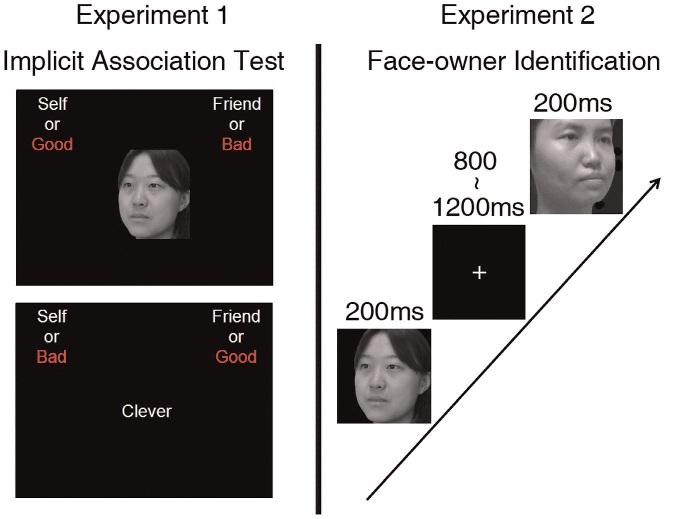Christianity, many people would agree, encourages adherents to think less about themselves and more about their group of co-religionists. Yina Ma and Shihui Han, of Peking University in Beijing, China, wanted to know if these teachings actually had meaningful psychological effects.
They recruited pairs of students: 10 pairs of atheists, and 10 pairs of Christians. All the pairs were matched for age and gender, and each pair of friends had known each other for at least two years during which they were roommates or classmates.
The did two tests, on of which was quite straightforward. They flashed up photographs of either the subjects own face, or their friend’s. The task was to recognised them by pressing an appropriate key: fast reactions on this one indicate that it was easy to recognize the face.
The second was a version of the Implicit Association Test. In this test, the subjects had to match either their own or their friend’s faces with positive (e.g. “good”) or negative (e.g. “bad”) words.
The theory goes that if you have a good opinion of yourself, or your friend, then you will find it easier to match the face with a positive word, and harder (i.e. take longer) to match it with a negative word. So this test is a measure of your gut feeling towards them.
Ma and Han found that atheists and Christians were equally fast at recognizing friend’s faces. Atheists were faster at recognizing their own faces but, remarkably, Christians weren’t.
They also found that atheists and Christians had equally positive feelings about their friends. However, while atheists were even more positive about themselves, Christians weren’t.
They went on to show that the results of the Implicit Association Test explained the results on the first test. In other words, the relatively low opinion Christians had of themselves was linked to their relatively tardy reactions on the self recognition test.
Ma and Han note that previous research has shown that Christian belief and practice that
emphasize human sinfulness seems to weaken positive attitudes toward the self, and suspect that this is what their results have shown:
…our results suggest that the implicit positive view of the self can be reduced by Christian belief and practice that repudiates the distinctness of the self and friends and this in turn can eliminate the advantage of self-face over friend-face in the believers.
Of course, Christianity is very much a minority religion in China, and Chinese have a collectivist culture, compared with Western individualism. So we can’t necessarily extrapolate these results to Christians and atheists elsewhere in the world.
Nor can it be assumed that all Christian sects have the same effect. Other research has shown that Calvinists seem to be ulta-individualistic compared with both atheists and Roman Catholics, for example.
However, it is intriguing to think about these results in the light of theories which propose that religions were invented as a tool to increase group cohesion.
![]()
Ma Y, & Han S (2012). Is the self always better than a friend? Self-face recognition in christians and atheists. PloS one, 7 (5) PMID: 22662231
 This article by Tom Rees was first published on Epiphenom. It is licensed under Creative Commons.
This article by Tom Rees was first published on Epiphenom. It is licensed under Creative Commons.














